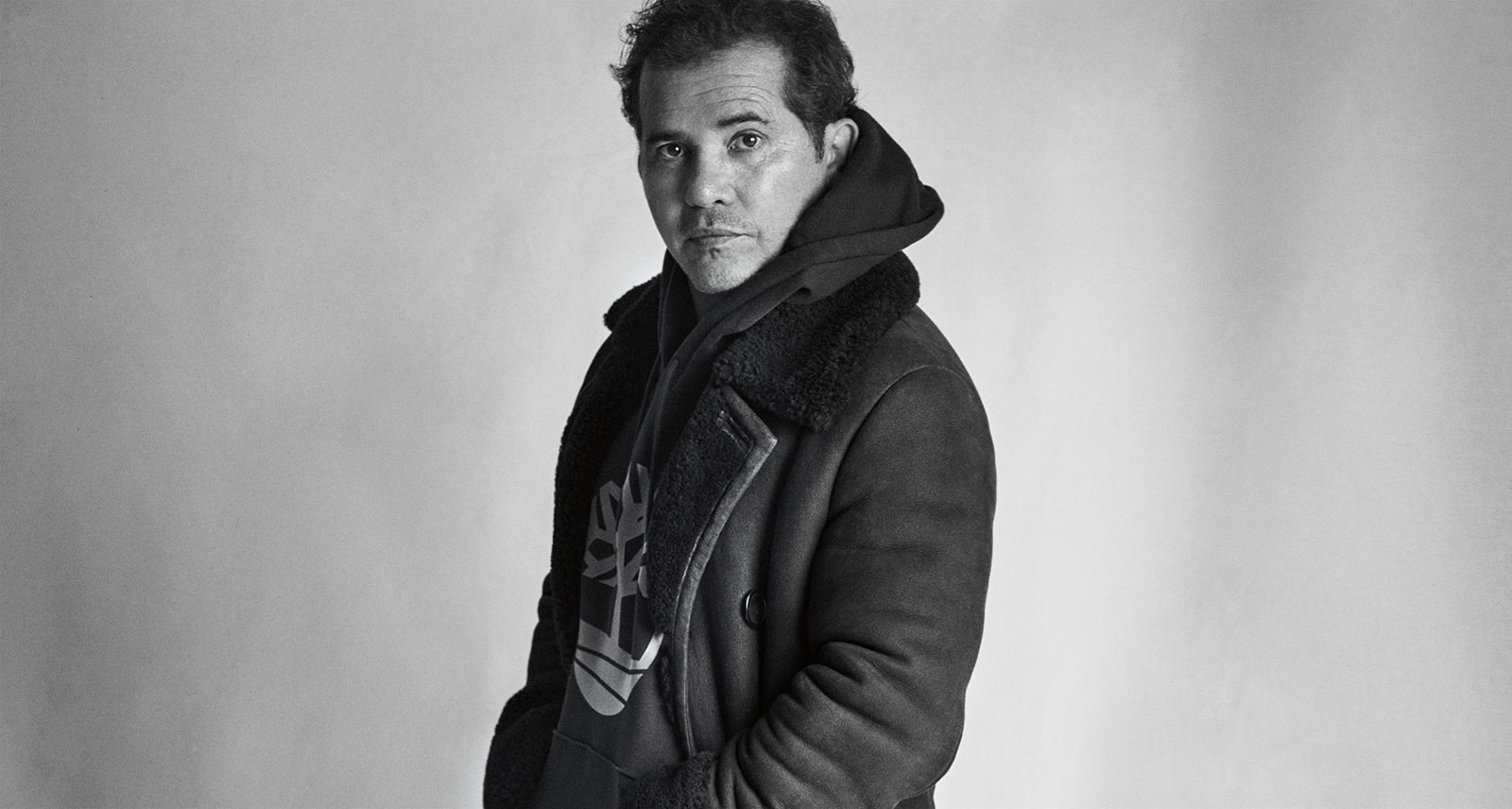John Leguizamo on His Directorial Debut, Hollywood Representation, and Fixing the System
Six months into the global pandemic and John Leguizamo finds himself thinking a lot about board games. There are the ones he’s been playing with his wife and kids at home, under lockdown orders in Manhattan: brainy word games like Scattergories, Boggle, and Boggle’s super-sized variant, Super Big Boggle. And then there’s chess, which Leguizamo has been especially obsessed with lately. The game of kings is at the centre of Critical Thinking, the 56 year-old actor’s first theatrical feature as a director. Leguizamo was all revved up to reveal the film in March, at the South by Southwest festival, only for the premiere to be cancelled; another Covid-19 causality. “I really thought we were going to be the big buzz of the fest,” Leguizamo laments, over the phone from New York City. “Of course we missed out on that. And theatre releases, we missed out on that.”
Instead, Critical Thinking — a based-on-a-true-story film starring Leguizamo as a high school teacher bootstrapping a group of ethnically diverse, economically disadvantaged students via his chess class — went straight to video-on-demand platforms, like so many of the year’s other releases. Ever the optimist, Leguizamo sees a silver lining the film’s adapted release strategy. “Coming out at this time when there’s a dearth of material,” he notes, encouragingly, “it does have the chance to be the little-movie-that-could. We’re getting a lot of attention.”
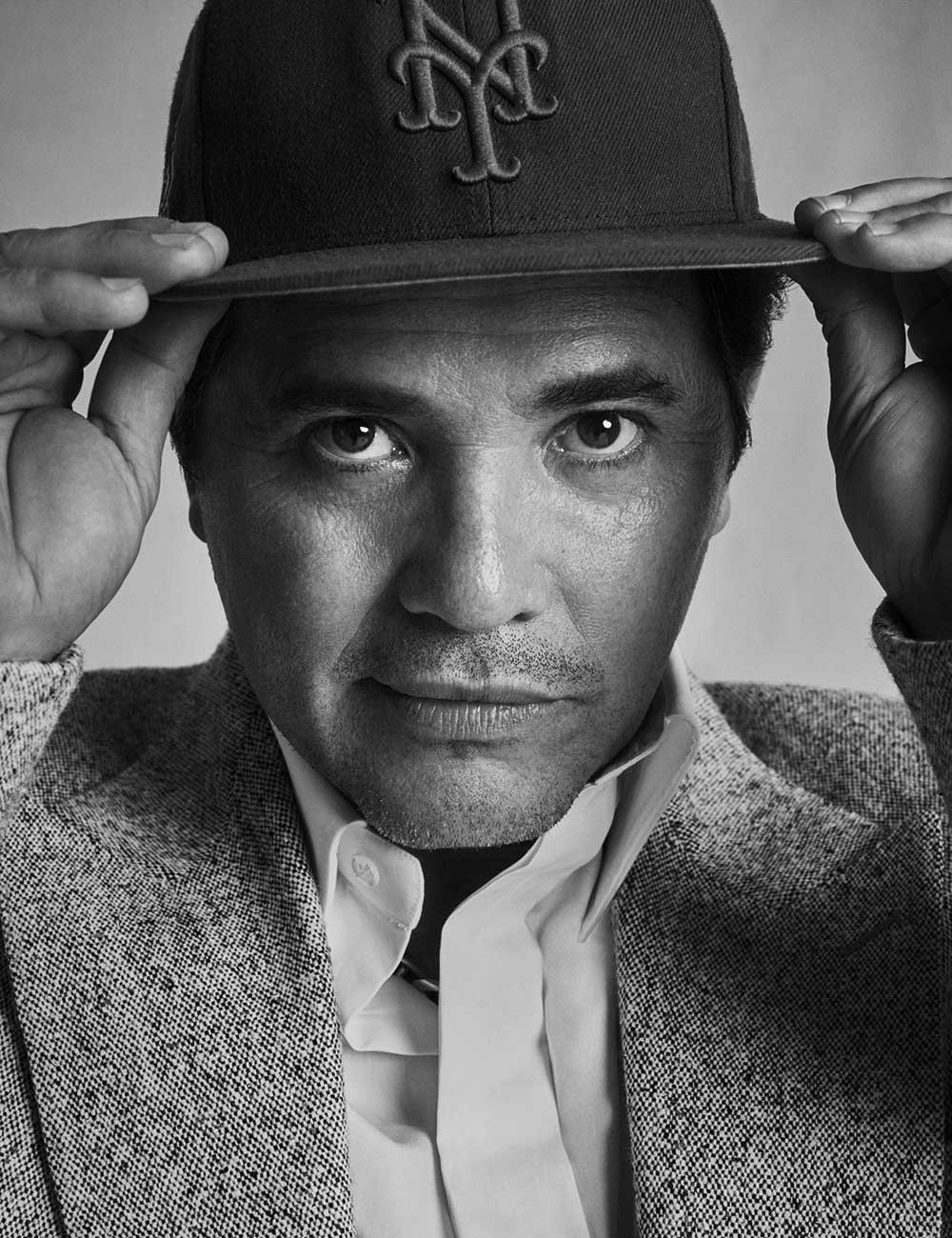 SUIT JACKET ($4,270) AND SHIRT ($1,330) BY ALEXANDER MCQUEEN; HAT JOHN’S OWN
SUIT JACKET ($4,270) AND SHIRT ($1,330) BY ALEXANDER MCQUEEN; HAT JOHN’S OWN
Critical Thinking’s inspiring story, evoking films like Stand And Deliver and Dangerous Minds, may feel familiar. What distinguishes the approach is an undercurrent that surges throughout Leguizamo’s career as a writer and performer: the marginalization of minority groups in America. In one scene, Leguizamo’s Mr. Martinez produces a history book for his class, offering the hard lesson that black and Latino stories are often written out of official histories. It’s a problem Leguizamo seems keen on addressing, especially as it pertains to Latino (or, as he prefers to call them, using the gender neutral pronoun, “Latinx”) populations. “It’s this psychosocial erasure that Latino people have to live with, for the last 500 years we’ve been here,” he explains. “It’s relentless, and it’s in every form. It’s like they’ve built a wall around our culture and America.”
Born in Colombia, Leguizamo’s family moved to the United States when he was just four years old. They settled in Queens, which Leguizamo describes in his 2006 biography Pimps, Hos, Playa Hatas, and All the Rest of My Hollywood Friends: My Life, as “the modern-day Ellis Island, where all the immigrants from all over the world are dumped when they come to this country.” A class clown and troublemaker, voted “Most Talkative” by his high school peers, he developed his sense of humour as a way of striking back against the neighbourhood bullies. He enrolled at NYU’s prestigious Tisch School to study theatre, only to drop out and pursue comedy. After working the stand-up circuit and scoring a few small roles in TV (Miami Vice) and films (he appeared as a terrorist henchmen in Die Hard 2, and a radio operator in Brian De Palma’s anguished Vietnam War film Casualties of War), Leguizamo got his big break with his off-Broadway play, “Mambo Mouth,” a one-man show he mounted in the hallway of an actual theatre. “Here I was, this Latin performer,” Leguizamo recalls. “Nobody believed that I could resonate with anyone. I wasn’t sure myself. But they liked what I was doing. So this great teacher, Wynn Handman, put me in the hallway of a theatre. I would do my show and the reviews came out and all of a sudden Al Pacino’s in the house, Sam Shepherd, Arthur Miller, Olympia Dukakis, John F. Kennedy Jr.; all white people.”
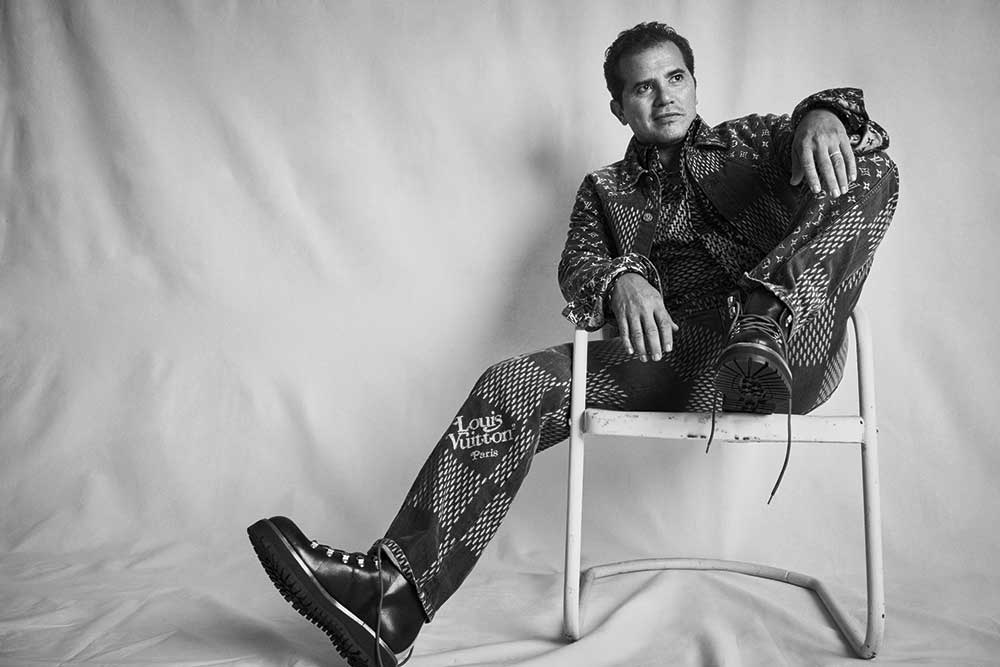 DENIM JACKET ($3,500), SHIRT ($1,900), PANTS ($2,080), AND BOOTS ($1,870) BY
DENIM JACKET ($3,500), SHIRT ($1,900), PANTS ($2,080), AND BOOTS ($1,870) BY
LOUIS VUITTON MEN’S
From there, Leguizamo began filling out legitimate theatres, drawing in Latin and Hispanic audiences. The positive notices also reinvigorated his movie career. The mid-‘90s saw him scoring leading roles in comedies, like The Pest and Too Wong Foo, Thanks For Everything! Julie Newmar. He shredded the scenery as Tybalt in Baz Luhrmann’s contemporary retelling of Romeo + Juliet, and Violator in Spawn, a film that was well ahead of the gritty-superhero movie trend. He played Luigi in the archly silly, and much maligned, Super Mario Bros. movie, anchored Spike Lee’s sweaty period piece Summer of Sam and stole every scene as loud-mouth, up-and-coming crime lord Benny Blanco from the Bronx in the Queen’s set crime epic Carlito’s Way.
That film reunited him with Casualties of War director Brian De Palma, and notable “Mambo Mouth” patron Al Pacino, who starred as the not-quite-reformed Puerto Rican gangster Carlito Brigante. While proud of his performance in it, Leguizamo admits that Carlito’s Way isn’t the sort of movie that could get made these days. At least not in the same way. “There were plenty of Latin actors in the movie,” he says. “But Hollywood didn’t believe a Latin man could carry a movie. Scarface is another one with brown-face, as we call it, with Pacino playing a Cuban. They wouldn’t hire Latin people, in prominent roles, even though they were doing our stories. Even Argo is about a Latin guy! But you wouldn’t know it!”
“It makes a great foundation for a character: someone who has witnessed things you could never begin to imagine. Then he comes back completely transformed.”
For Leguizamo, such marginalization isn’t some professional gripe. Certainly, he’s done incredibly well, personally: wracking up nearly 200 credits as an actor on film and TV, with plenty more as a writer and producer. It’s bigger than that. It’s about what he calls “cultural apartheid”: the problem of Latin and hispanic communities not seeing themselves reflected in American art and entertainment. “We are diminished,” he says. “We are stricken out. We’re not included. You’re living in this world where you exist but you don’t see yourself reflected anywhere. Not in the history textbooks, not in the literature you’re reading, not in the comic books or graphic novels you’re looking at, not in the new shows you’re watching. So you’re living and breathing, and your family’s Latin and your friends are Latin, and your heroes in the community are Latinx. But you just don’t exist elsewhere.”
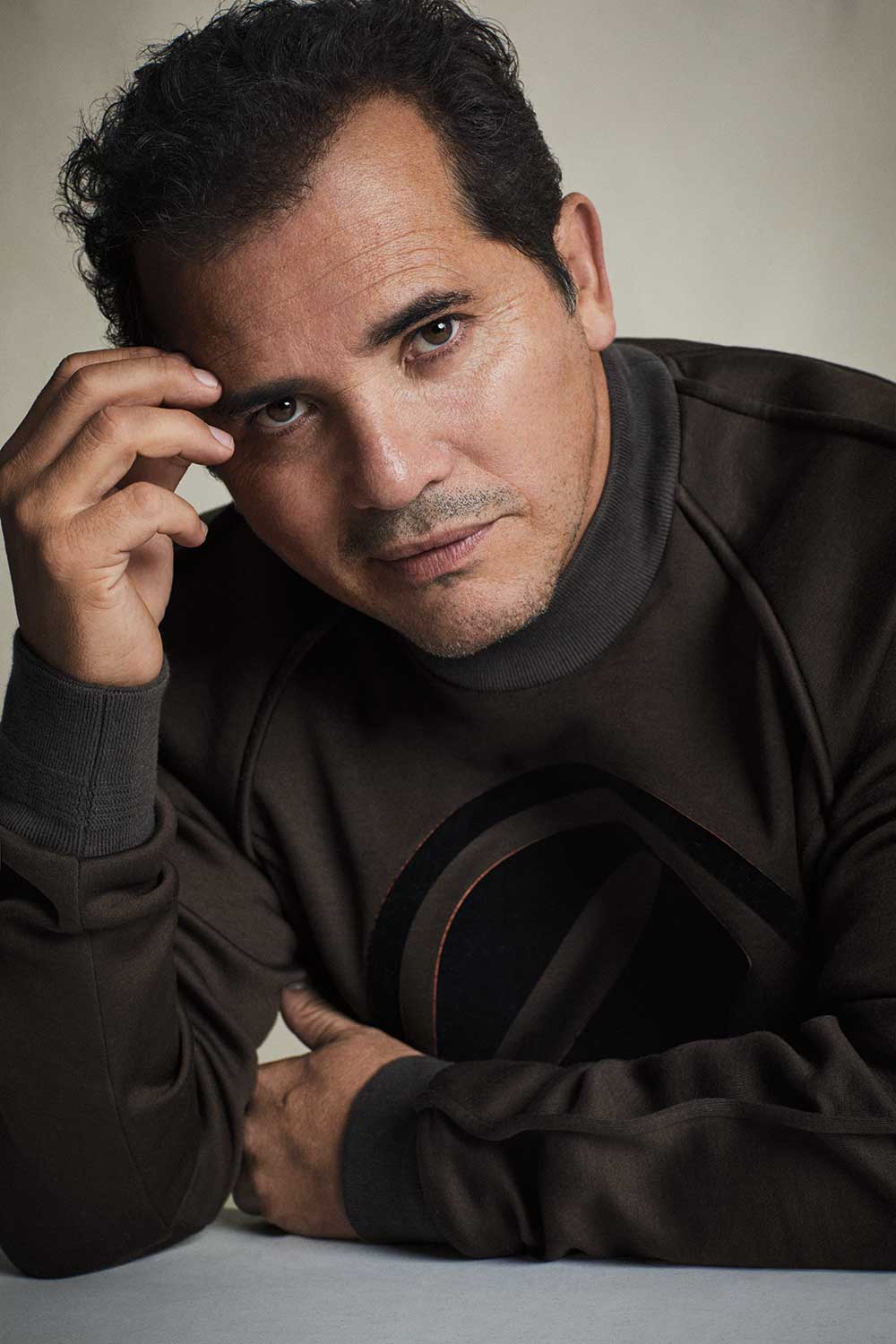 SWEATER ($1,135) BY ERMENEGILDO ZEGNA XXX
SWEATER ($1,135) BY ERMENEGILDO ZEGNA XXX
In terms of actually rectifying this diminishment, Leguizamo regards recent changes in the Academy Awards qualification system, which now demand that movies meet certain criteria for diversity in both storytelling and production, as a good start. He also cheers the political advances of groups like Black Lives Matter, in calling attention to systemic racism in America, which can seem invisible, often by design. “It’s a beginning,” he says. “It’s a great start to changing things. And it has only happened because of Covid, and being at home, and [being] forced to reckon with ourselves. I feel like America is finally grappling with its white supremacy.”
Despite all the family rounds of Boggle and Super Big Boggle unfolding in Casa Leguizamo, the actor’s been using the coronavirus shutdowns not to slow down, but to devote himself to passion projects exploring the untold histories of Latinx people across the Americas. “I’m speeding up,” he says. “The pandemic took away the bullshit distractions of work for the sake of work.”
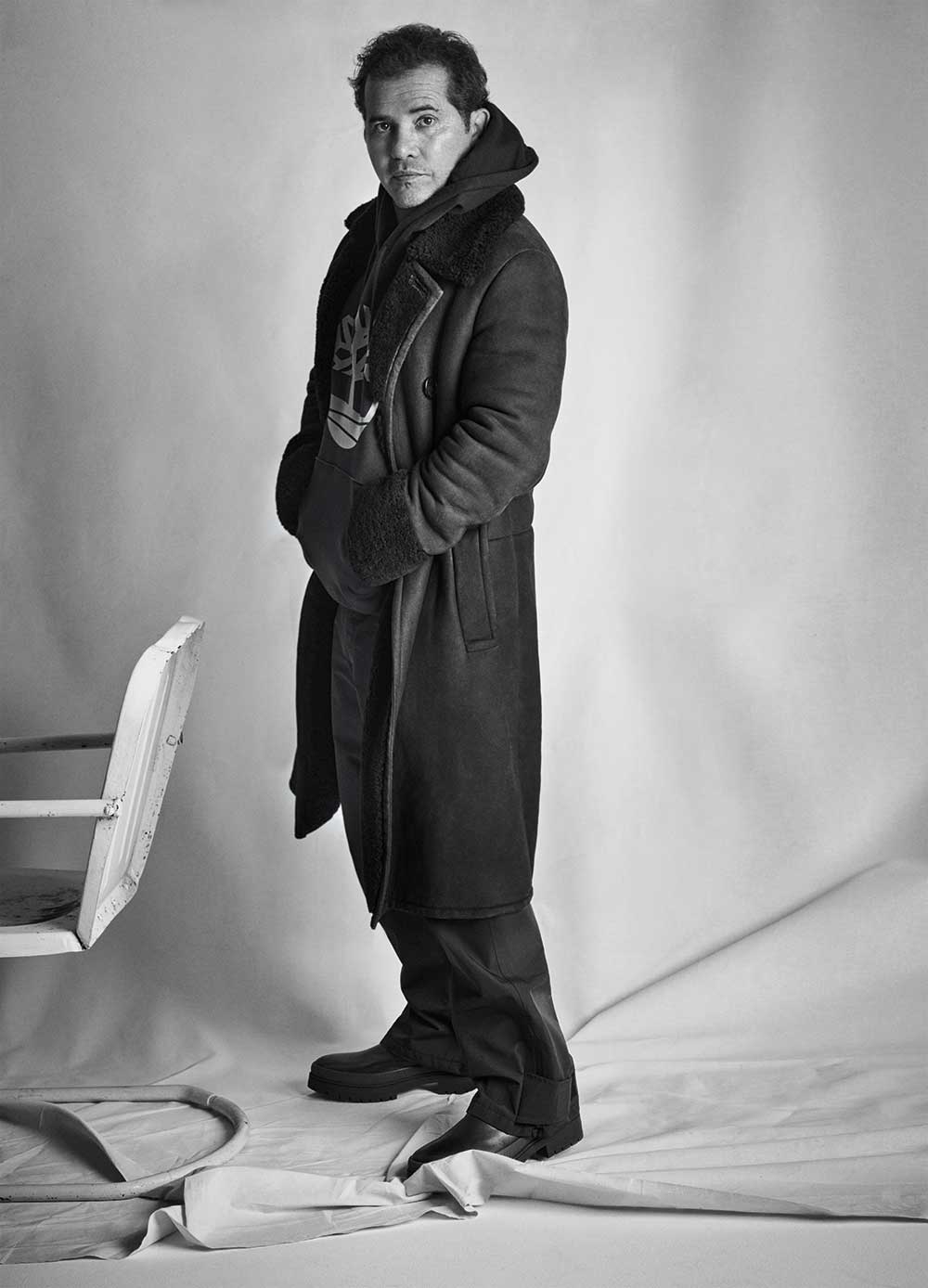 SHEARLING COAT ($10,500) BY PRADA; HOODIE ($80) BY TIMBERLAND,
SHEARLING COAT ($10,500) BY PRADA; HOODIE ($80) BY TIMBERLAND,
PANTS (1,175) AND BOOTS ($1,600) BY HERMES
Chief among these projects is Kiss My Aztec, a historical musical love story dealing with what he calls, tongue firmly in cheek, the “hilarious concept of genocide and conquest.” And he’s developing another musical, also comedic, set against the backdrop of ICE detention centres. He admits he’s struggling a bit with that one. “I want people to pay attention to the family separations, and the horrors happening in these detention camps. I want to call attention to it with humour, which is really difficult. I don’t want to be offensive. But it is offensive. It’s a delicate dance.”
Even considering Leguizamo’s wild career ambitions — from director-star of a feel good movie about chess to playwright of a set of musicals about genocide and family separations — is enough to give you whiplash. “Necessity is the mother of invention,” he jokes, offering what might as well be a motto for his whole career. Whether ducking the bullies in Queens as a kid, setting up his one-man show in the hallway of an Off-Broadway performance space, or adapting his new movie’s release strategy to accommodate for a global pandemic, Leguizamo is nothing if not resourceful. His ability to seize opportunity evokes his beaming, glad-handing go-getter Benny Blanco from the Bronx. But his dreams are even bigger. He imagines a culture, and a whole world, where Latinx populations will be rewarded and represented on the basis of their role in society, where they won’t be reduced to scrambling around the margins of Hollywood. “If Latino people are 20 percent of the population,” Leguizamo reasons, “I want 20 percent of the stories being told on Netflix, Amazon, networks, new shows to be about Latin people.”
